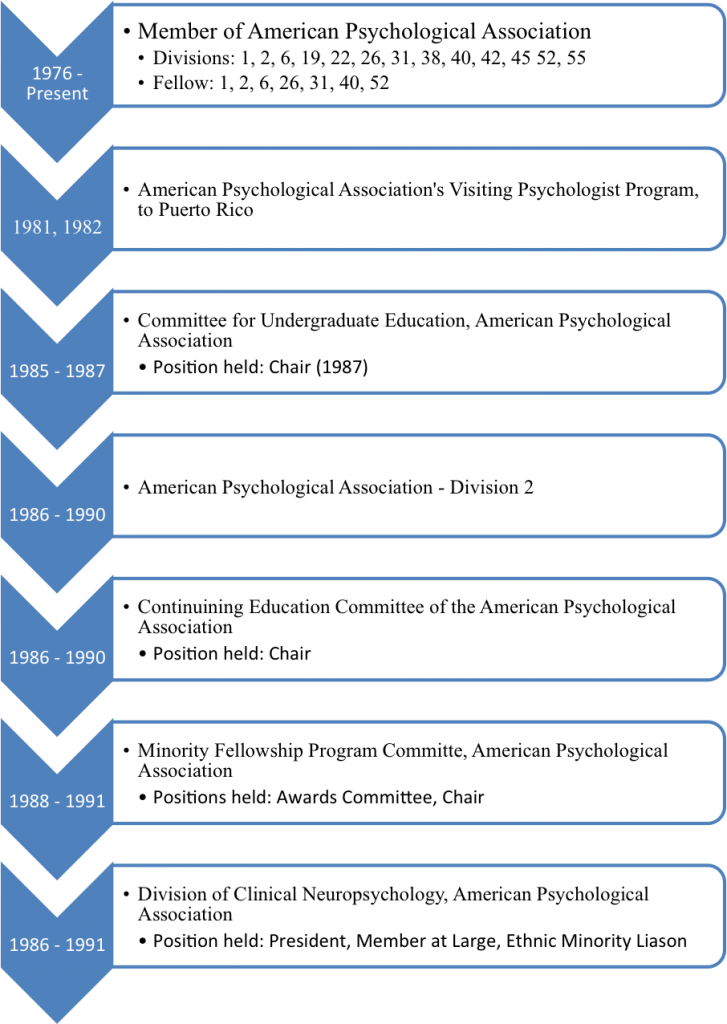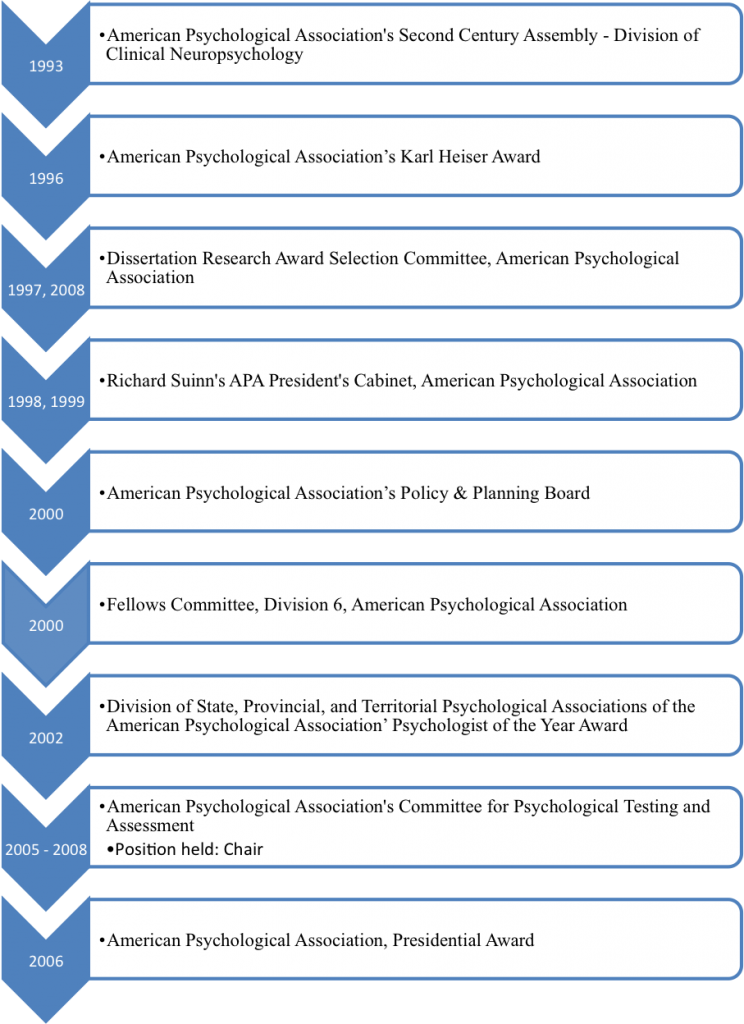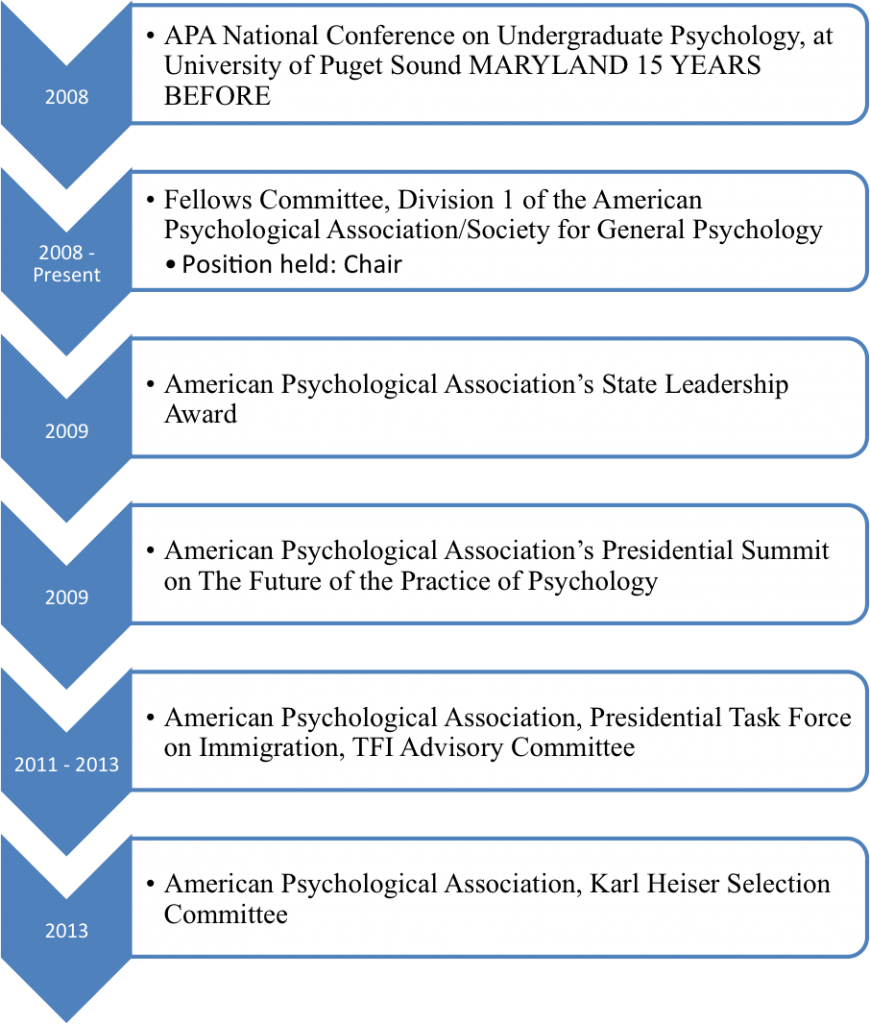Tony’s APA campaign platform
1. Psychology as a Healthcare Profession
Issues (APA Monitor: Psychology’s Visionary)
- Psychology as an evidence based healthcare profession (American Psychologist 2011)
- Professional psychology involves mental and behavioral health
- Psychology professional = medical professional
- Collaboration with other health professionals
- Psychology as the catalyst to integrative healthcare (AMA Integrative Care 2013)
- Clinical Neuropsychology as a prime example
- Other examples: include Health Psychology, Medical Psychology, RxP, and others
- Inclusion in insurance panels as health professionals and not just mental health professionals (no carve outs)
- Psychology as the integrative mechanism of healthcare in the Affordable Care Act
- Psychology as health as a paradigm for professional psychology
- Mattarazo presidential address 1968 Div. 38
- Whole-person and one health approach
2. Psychology as a Science
Issues
- Science as a foundation for all of psychology
- Psychology viewed as a STEM discipline
- Re-recruitment of academics & scientists
3. Diversity in Psychology
Issues
- Demographics of the APA should better match the demographics of the US (Towards a Psychology of Variance Chapter)
- Generalization of psychology to a more global platform
4. Training and Education in Psychology
Issues (Professional Psychology in health care services)
- Training as a continuum, especially of mentorship, from high school through continuing education
- Increase number of internship slots and sites
- Provisional Licensing of post-doctoral fellows (Similar to physicians)
5. Leadership in Psychology
Issues
- Within Psychology: Scientist-Practitioner and supportive of Clinician-Scholar model
- Outside Psychology: Leading healthcare out of present crisis, through AMA, CPT and CMS primarily Medicare as well as ACA
An APA for All Members!
- Tony’s platform is his history, psychology as a healthcare profession founded on and supported by science, education & training, and public service
- Two primary issues
- Economic (parity)
- Social (diversity & representation)
- Provides a vision of hope
- Psychology has not been as effective in the past in placing itself in the role it deserves; Start by changing its focus to a leader instead of a follower in health care
- This paradigm is needed by the profession and APA
[expand title=”Platform Statement” trigclass=”highlight”]
On July 8, 1892 a group of 31 diverse individuals met at Clark University to form the American Psychological Association with a vision for “a new psychology”. When 18 of them subsequently met at the University of Pennsylvania that December, the foundations were laid for a scientific psychology that focused on professional goals. Is APA in a position to continue to realize both the scientific foundation and professional goals outlined by our forefathers?
Psychology has not yet achieved the dreams that we were given. In some cases psychology is viewed as a second-class citizen in the world of science and health care. I am sick and tired of being as perceived as such. I first understood what it was to be a second-class citizen (actually an “Alien” is what they called me) when I emigrated from Cuba at 9. I did not know English nor American culture; did not even have enough to eat. Now that I have learned English and am now a psychologist, I find myself again being perceived as a second-class citizen. I have grown impatient with that station in life and I am sick and tired of this inequality.
I am disgruntled with university administrations’ believing that we are not a STEM science. Psychology should not be taught to large enrollment sections simply for economic reasons. It is embarrassing that only 50% of our students secure APA internships. I am in disbelief about the limited engagement that psychology has with our diverse world. I am through with physician colleagues receiving better reimbursement and access to clinical opportunities.
It is, however, a time of hope, of dreaming, and of excitement. That is what my students- from undergraduates to post-doctoral fellows as well as what my colleagues, clinical and academic, from both here and abroad, tell me. That is what my two children in psychology tell me- Krista, a PsyD, in Florida and my older son, Nicolas, a PhD, who is starting his post-doctoral fellowship at Hopkins. That is what my son, Lucas, who is studying political economics and what my wife, Linda, who has secondary multiple sclerosis, also say. And that is what I have come to believe. This is not a time of desperation and learned helplessness. It is indeed a time of hope, of dreaming and of excitement as well as a time to finally give psychology away.
However, dreaming without with direction is nothing more than moving clouds. I was faced with two options many years ago: 1) Give up and adapt to this second class status and the present unfortunate situation or 2) do something about it. And for a quarter of century I have dedicated myself to eradicating this situation and the incorrect perception of who we are and what we can do to make the world a better place.
Let me provide one example of what I have done to secure our future. I started, with the help of Sally Cameron, the Executive Director of the North Carolina Psychological Association, when I became President of our state association, and asked Blue Cross and Blue Shield of North Carolina to allow me to bill for neuropsychological services. With the audacity and enthusiasm of an adolescent, I asked to be payed for what I knew which was based on science and experience That resulted in eventually APA, through APA’s Practice Directorate, appointing me as the first psychologist and one of 10 non-physicians (HCPAC) to the AMA CPT Advisory Panel of 120. After 15 years of fighting in the trenches for psychology in the HCPAC (and most recently for the psychotherapy codes we are all now using), I had the dream of being part of the actual panel. I wanted to shift my role from advisor to policy maker. With luck and who knows what, I now sit on that 17 member panel with the same vote as Medicare, Blue Cross Blue Shield, Hospital Association of America and others.
Psychology HAS a seat at the table in health matters. Psychology is now in a position to expand the role of professional psychology to all of health care as well as to guide the development of all of health care in America.
The premise behind this focus of providing appropriate economic support for the profession of psychology is simple. Based on surveys I have conducted as well as actual membership, the members of APA are mostly professional. Further, scope of practice and reimbursement rate as the major concerns of our members. The assumption is as follows: if the profession of psychology is strong and economically viable, a strong infrastructure necessary to support the profession of psychology would equally be required. Hence, the student pipeline, the research behind the theories and the application of psychology to the greater good would all similarly flourish. Without each other, there would not be psychology.
Not only do we have to obtain the economic opportunity for the practice of psychology but
- We must have science be the foundation of psychology,
- We have to obtain the educational and training opportunities, resolve the internship crisis and boost clinical training funding, and
- We must make psychology reflective of and responsive to those we seek to understand and serve.
I am not running against other candidates. I am not against Medicare and insurance companies. I am not against those that do not appreciate the STEM nature of who we are. And for that matter I am not against those that seek to narrow our vision of psychology being for the greater good. I am, simply put, running towards the vision of our forefathers and for the science and profession of PSYCHOLOGY (see www.puenteforpresident.com orwww.antonioepuente.com).
We must refocus our vision to foster a “new psychology” based on scientific foundations and professional goals.
I believe in being able to change systems. I believe in, our science, our profession and in our ability to understand and serve ALL people. It is our future and it is our psychology. Finally, I believe in a dream of working together to place psychology where it rightfully belongs- as a leader.
It is time for Psychology.
WILL YOU WORK WITH ME TO MAKE THIS DREAM COME TRUE?
Muchas gracias.
[/expand]
[expand title=”Additional information” trigclass=”highlight”]
Read Tony’s responses and statements to the APA and other organizations
View the results from the campaign’s surveys
[/expand]
[/su_tab]
[/su_tabs]
[expand title=”Click to learn more about Tony” trigclass=”highlight”]
[su_tabs][su_tab title=”Bio”]
I was born in Cuba and received degrees from the University of Florida (BA) and the University of Georgia (MS, PhD). I was a clinical psychologist at a teaching psychiatric hospital and a professor of neuroanatomy at a medical school before becoming a Professor of Psychology at the University of North Carolina Wilmington. I am also a Visiting Professor at the Universidad de Granada (Spain) and UCLA.
Since 1982, I’ve maintained a private practice limited to clinical neuropsychology. In 2002 I founded and now co-direct (with a PharmD) a bilingual mental health clinic for the poor and uninsured in our region (Cape Fear Clinic).
I have authored/edited 8 books, 78 book chapters, 102 journal articles (English, Spanish and Russian). My research focus has largely been on the interface between culture and clinical neuropsychology. I founded and edited Neuropsychology Review, the Journal of Interprofessional Healthcare, and a book series in clinical neuropsychology (33 books). I have lectured in over a dozen countries and supervised fellows or visiting scientists from Mexico, Russia, South Africa, and Spain. I have taught over 7,500 undergraduate students, supervised 30 graduate students and 6 post-doctoral fellows.
I am Past-President of the North Carolina Psychological Association, North Carolina Psychological Foundation, National Academy of Neuropsychology, Society for Clinical Neuropsychology (Division 40) and Hispanic Neuropsychological Society. I also served two terms as a Council Representative for Division 40. Other leadership positions I’ve held include chair of the Psychology Academy of the National Academies of Practice and several APA Boards and Committees ranging from the Board of Convention Affairs to the Committee for Psychological Tests and Assessments as well as served on others, including the Policy and Planning Board. I recently served on the Joint Committee for Standards for Educational and Psychological Testing.
Between 1993 and 2008, I was APA’s representative to the American Medical Association’s Current Procedural Terminology panel and was then elected to the Editorial Panel of the CPT (voting member). I also was on the Center for Medicare and Medicaid’s Medicare Coverage Advisory Committee.
I have received several awards, including: Fulbright Scholar Award 1983 (Argentina), UNCW’s Distinguished Faculty Scholarship Award 2009, North Carolina Psychological Association’s Lifetime Achievement Award 2008, the APA’s Karl Heiser Award 1996, Presidential Award 2006, State Leadership Award 2009, and Distinguished Professional Contributions to Independent Practice 2011.
I am married to Linda with whom I have three children (Krista- a clinical psychologist at a psychiatric hospital in Florida, Antonio Nicolas- a PhD student in clinical psychology at Georgia and completing his internship at Duke, and Lucas- a PhD student in political economics at Stanford). I have vigorously served psychology as an advocate and leader, the public in my clinical practice, the scientific community (in the US and abroad) and generations of students as a professor of psychology. I understand, live and have lead in all aspects of our diverse psychological community.
[/su_tab]
[su_tab title=”Timeline”]
Puente’s APA Timeline


[/su_tab]
[su_tab title=”CV”]
[su_button url=”http://antonioepuente.com/vita” target=”blank” style=”soft” icon=”icon: file-text-o” icon_color=”#ffffff”]View my CV[/su_button]
[/su_tab]
[su_tab title=”Links”]
Antonio’s Websites
- AntonioEPuente.com
- UNCW Department of Psychology
- UNCW Neuropsychology Lab
- Private Practice Website
- PsychologyCoding.com
- RogerSperry.org
- Josephbogen.info
[/su_tab][/su_tabs]
[/expand]